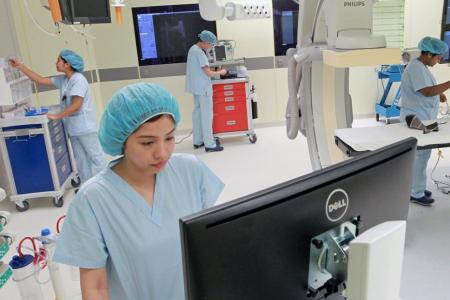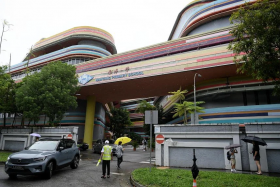Ministry may make digitising records mandatory
Few private clinics take part in National Electronic Health Records
The Ministry of Health (MOH) has been trying for years to get the private sector on board the National Electronic Health Records (NEHR) with little success.
Now, it might take off the velvet gloves and make it compulsory.
Ministry officials have been discussing plans to make participation in the NEHR a licensing requirement under a new Healthcare Services Act, so clinics and hospitals will have to provide patient information to the system.
The NEHR, launched in 2013, is now used by all public healthcare institutes and a few private ones.
It allows doctors and other healthcare professionals to access a patient's medical history, including hospital discharge summaries, allergies and laboratory and radiology results.
The idea is that this will help doctors take care of patients better, and avoid duplication of medicine or tests, or accidentally giving drugs a patient is allergic to. This is especially important if a patient ends up unconscious in an emergency department.
But other than from 40 clinics out of more than 2,500 general practitioner (GP) and specialist clinics, there has been no input from the private sector, although the MOH has long urged greater participation.
FEEDBACK
An MOH spokesman told The Straits Times that it was still gathering feedback on this: "These policies are currently still under evaluation and review, and we are targeting for a public consultation on the Healthcare Services Act by the end of 2017."
Ministry officials have been speaking to doctor groups for feedback on such a move since last year.
They met the Singapore Medical Association (SMA) in November last year. SMA has raised some concerns, which it conveyed to the MOH in March.
This letter, published in last month's edition of newsletter SMA News, had association president Wong Tien Hua expressing concern over the difference between privacy and confidentiality.
The NEHR allows people to opt out.
If they do so, their records remain in the system but cannot be accessed by healthcare professionals.
Should they decide later to opt in, their medical information, which continues to be gathered though not shared, can be made available.
The SMA feels that while this satisfies confidentiality, it is not enough.
Although healthcare professionals who are not treating the patient are not supposed to access the person's information, it has happened.
The letter said: "Even though a doctor or healthcare professional can be punished for accessing a patient's records without valid justification, such measures are punitive and retrospective in nature, after the transgression and damage has already been done."
So while the SMA agrees in principle to the national participation in the NEHR, it would like such privacy issues to be addressed first.
Two members of the Government Parliamentary Committee for Health supported making participation in NEHR compulsory.
Its head, Dr Chia Shi-Lu, said: "Considering that a majority of patients seek primary care from GPs, and a significant number from private specialists and hospitals, the impact of our NEHR system would be significantly curtailed if these records from the private healthcare sector are excluded."
Tanjong Pagar GRC MP Joan Pereira said that making participation in the NEHR a licensing requirement is a step in the right direction as "patients would ultimately be better off".
As it requires investment, "more support can be given, especially to the GPs to help them join the NEHR", she said.
Get The New Paper on your phone with the free TNP app. Download from the Apple App Store or Google Play Store now



